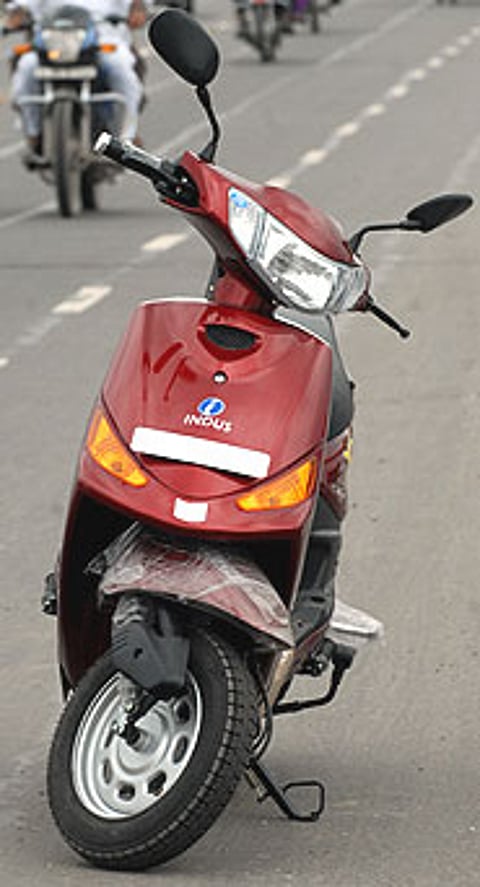Coy Shades Of Green
Eco-friendly cars are yet to reach the cost-energy efficiency balance

The Yo Byke needs to be charged everyday |
But the most significant announcement came last month from Tata Group chairman Ratan Tata—that Tata Motors is developing an electric car in collaboration with a Norway-based company. They are also working with the Thai government to develop an energy-efficient, eco-friendly car. The Tata electric car, expected to hit the roads by 2009, is likely to create as big a stir in motoland as did its Nano. Tata Motors is also working with French company mdi to develop an engine that would run on compressed air and be one of the cleanest in the world.
But while there's a lot of enthusiasm about the new technologies at the companies' end, the response from customers and experts has been less so. One of the main reasons for this is the high cost. The Reva-i, which starts at Rs 2.99 lakh, costs more than the much-tested Maruti 800, Maruti Omni and Maruti Alto. Even the GM Spark is currently available for Rs 2.66 lakh, under a limited period offer. The Honda Civic Hybrid, at Rs 21.5 lakh, costs Rs 10.5 lakh more than the standard Civic which starts at Rs 11 lakh in Delhi.
The Reva which was launched in India a few years ago, was recently relaunched as Reva-i with much fanfare by Delhi CM Sheila Dikshit. This reincarnation, according to company officials, has a new motor which gives it more power and 20 per cent better acceleration and 80-90 km running on a single charge. The company is working on a new lithium-ion battery which will boost performance by several notches and run the car for around 300 km on a single charge, but this would also push costs up by 100 per cent. And of course, the Reva-i, which has a lavish dose of plastic and fiberglass, is quite vulnerable in bigger cities where large and commercial vehicles pose serious safety challenges to its passengers. There's also the hassle of charging the battery, which takes 6-7 hours for a full charge. So if you're staying in a multi-storeyed apartment, be prepared to carry a long extension wire to charge your car. It's the same story for the Yo Bykes launched by Ahmedabad-based Electro-Therm India, which need to be charged every day. And with India's kind of power shortage and outages, you may just be stranded on the road.
Chetan Maini, deputy chairman and CTO, Reva Electric Car Company, upbeat after the sale of 1,000 cars in London, feels it would offer an attractive new alternative to Indians. Says he: "I follow the cellphone theory where sleek, small and more expensive is what people demand. It's also cool to be green and electric today."

The hybrid, on the other hand, seems to be a better option apart from the price. The Honda Civic Hybrid drives as smoothly as a large car would. The changeover from petrol to battery is automatic and the battery charges itself every time you press the brakes (courtesy the regenerative braking technology used here). The air-conditioning runs perfectly on battery and there are no hiccups or jerks when you shift from petrol to electric. The biggest block, again, is the price. The saving on fuel is certainly not compensated by the additional amount one pays for the hybrid. Says Jnaneshwar Sen, senior GM, Honda India: "There's a duty of over 100 per cent on the car which is imported as a completely built unit (CBU) from Japan. Globally, there's a difference of just Rs 1-2 lakh between petrol and hybrid models and in the US, the government gives a subsidy of $2,500 on such vehicles." Adds auto expert and editor of Autocar India, Hormazd Sorabjee: "These vehicles have to be driven by the government through incentives. They are facing the cyclical problem of high cost of technology leading to low volumes."
Clearly, large automakers are not talking numbers yet. Honda, for instance, has said its objective is not to get large volumes but to give Indian customers an opportunity to experience new technology. But even globally, offtake of their hybrids has been less than enthusiastic. The company launched its first hybrid, Insight, in 1999. The Civic came in 2001 and the Accord in 2003. Yet, till date, it has sold just 2.6 lakh hybrids across the world. In India, the figures are still in double digits.
Hyundai Motors, which has hybrids in its global portfolio, has refrained from launching them in India. The company which, like its arch rival Maruti Suzuki, launched bi-fuel cars using CNG, feels that with 70 per cent of India's market being in compact small cars, there was little scope for expensive hybrids. Says C.V. Raman, CGM, engineering, Maruti Suzuki: "India is predominantly a small car market and the hybrids are aimed at the upper premium segment. The issue is whether the cost of the technology will come to the lower segment in the future." Maruti Suzuki was one of the first companies to start CNG and bi-fuel cars but the commercial success of these vehicles has been limited by uneven availability of these fuels across the country. At present, CNG is primarily available in North India.
Recently, the Indian government took a decision to reduce excise duty on hybrid cars and even offered incentives on electric cars, but not enough to significantly push usage of such vehicles. But with rising fuel prices and environmental consciousness reaching a crescendo, this could be the right time for the government to up the ante.
Tags